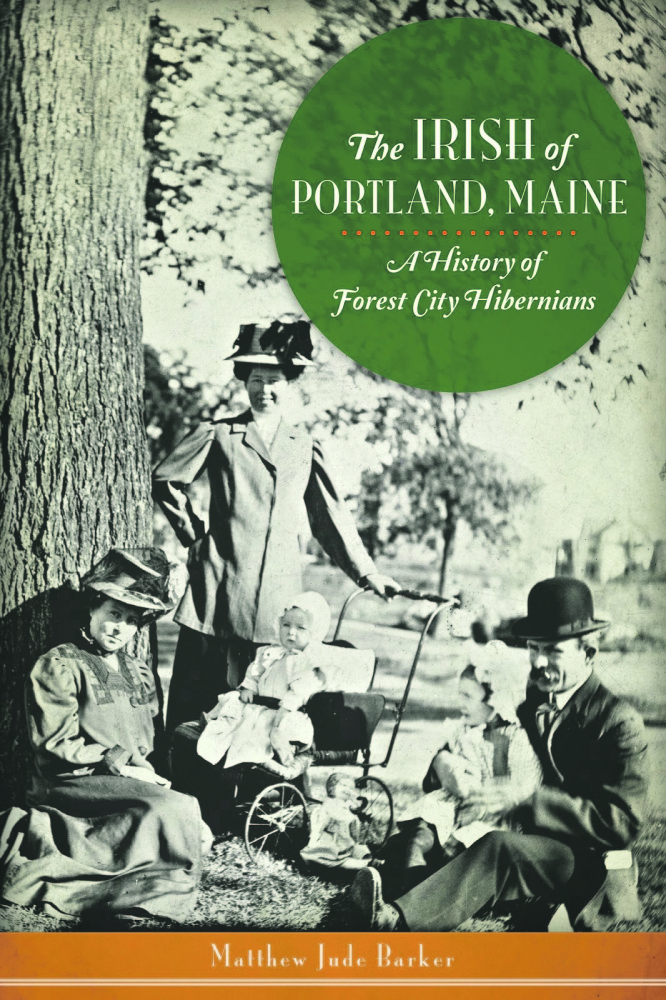Matthew Jude Barker’s trim, readable and accurate new volume, “The Irish of Portland, Maine: A History of Forest City Hibernians,” sets out to tell the story of the arrival, lives and contributions of the men and women from one key ethnic group in Maine’s largest community from 1661 to 1901.
Anyone acquainted with local history will agree this sort of overview study is difficult to bring off well, especially within the limits of 160 pages, with footnotes and index. It’s often like producing a boat in a bottle: basic hull, masts, sails and very little detail.
Barker, who is Irish on his mother’s side and an integral part of the local community, gives the reader far more.
Over a solid historical framework, he weaves the stories of the fortunes and misfortunes of the men and women who have helped shape the texture and destiny of Portland.
“The Irish of Portland, Maine” accomplishes pretty much everything Barker sets claim to in the Introduction.
His eight chapters cover “An Invisible Presence: 1661-1798,” “Catholic Foundations: 1798-1828,” “Early Church and Famine Eras: 1828-1850,” “Decade of Decadence: 1846-1856,” “The Irish and A New Diocese, 1850-1860,” “Civil War Era: 1860-1866,” “The Irish Community: 1860-1901” and “Irish Nationalism: 1865-1901.”
The important elements of the national saga – told from the bottom up-are touched upon – without over-copious shedding of tears for dear old Erin’s Isle.
By this I mean Barker is critical, open to the facts and not reliant on traditions and previous patterns.
In other excellent works, including James H. Mundy’s “Hard Times, Hard Men: Maine and the Irish, 1830-1860” (1990); “They Change Their Sky: The Irish In Maine” (2002), edited by Michael C. Connolly; and in my own essays, the prohibitionist Neal Dow (1804-1897) has been portrayed, not inaccurately, as the “Snidely Whiplash” of the local anti-Irish militants.
Barker acknowledges this, but for the first time discovers Dow at an 1882 Land League meeting, saying, “There are no people in the world more industrious than the Irish, more patient of fatigue, more economical in their habits when the conditions are right.”
This discovery by Barker in the local newspapers, which he has come to know as few other researchers have, adds new dimension to this man.
Consider also Father Denis Bradley, who became the first bishop of Manchester, N.H., in the 1880s after serving at Portland’s cathedral. Some years past, my wife bought a photograph of Bradley because of the Maine association, but found little about him in the Catholic history of Maine.
Barker presents the young priest as a full-blooded crusader who brought back word of the 1880 Irish famine, and raised indignation and large amounts of money among local Protestants and Catholics.
Indeed, the new book restores young Bradley to his place in local social history.
Though this is Matthew’s Barker’s first solo book, longtime historians and genealogists will not be surprised by its readability and carrying capacity.
Now resident historian at the Maine Irish Heritage Center on Gray Street in Portland, he has been a serious contributor to our shared knowledge since the 1980s, as editor-publisher of the genealogical newsletters The Shamrock Connection (1995-98) and current Downeast Shamrock.
He’s also been a contributor to important books, including “The Western Cemetery Project” (2002); “They Change Their Sky: The Irish in Maine” (2004) and “John Ford in Focus” (2008).
Barker has published popular and academic articles on both sides of the Atlantic. I am not alone in noting that every time I read something of his, entirely new things are learned.
William David Barry is a local historian who has authored and co-authored seven books, including “Maine: The Wilder Side of New England” and “Deering: A Social and Architectural History.” He lives in Portland.
Send questions/comments to the editors.



Success. Please wait for the page to reload. If the page does not reload within 5 seconds, please refresh the page.
Enter your email and password to access comments.
Hi, to comment on stories you must . This profile is in addition to your subscription and website login.
Already have a commenting profile? .
Invalid username/password.
Please check your email to confirm and complete your registration.
Only subscribers are eligible to post comments. Please subscribe or login first for digital access. Here’s why.
Use the form below to reset your password. When you've submitted your account email, we will send an email with a reset code.